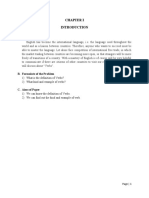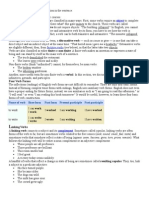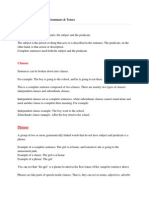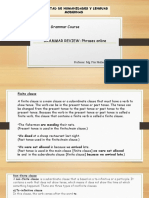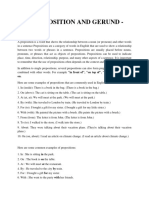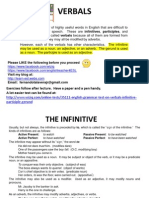Fineite and Non Finite Verbs
Fineite and Non Finite Verbs
Uploaded by
sonynmurthyCopyright:
Available Formats
Fineite and Non Finite Verbs
Fineite and Non Finite Verbs
Uploaded by
sonynmurthyOriginal Title
Copyright
Available Formats
Share this document
Did you find this document useful?
Is this content inappropriate?
Copyright:
Available Formats
Fineite and Non Finite Verbs
Fineite and Non Finite Verbs
Uploaded by
sonynmurthyCopyright:
Available Formats
HALF YEARLY 2020-21
CLASS VI
ENGLISH GRAMMAR
FINITE AND NON FINITE VERBS
There are mainly two types of verbs in English – finite and non-finite.
Finite verbs change their forms when there is a change in the number or person of the subject.
Finite verbs also have different forms in different tenses.
In the following sentences, state whether the verb given in the inverted commas is finite or non-finite.
Finite verbs can be predicates of sentences by themselves. Example: She is playing.
A modal auxiliary is a verb that is used with another verb to express a mood or tense.
Examples of a modal auxiliary include can, may, must, ought, shall, should, will and would.
Modal Meaning Example
can to express ability I can speak a little Russian.
can to request permission Can I open the window?
may to express possibility I may be home late.
may to request permission May I sit down, please?
The modal auxiliaries can,could,will,shall,should,would,might do not change with number and person of the
subject.They are finite verbs,because they can be predicates of sentences by themselves.Example: I can swim.
Non-finite verbs do not change their form when the number or person of the subject changes.
Example: I like to play tennis.
They like to play tennis.
Non finite verbs cannot be the predicate of a sentence by themselves.
Example: I like to play tennis.
Here, like to play sentence: Predicate
To play: non finite verb
Exercise:
1. My little brother 'wants' to be an actor.
finite
non-finite
2. She worked hard 'to pass' the test.
finite
non-finite
3. I 'couldn’t solve' the problem.
finite
non-finite
4. 'To err' is human.
finite
non-finite
5. Your duty is 'to cross' the river without getting noticed.
finite
non-finite
6. The doctor 'is attending' to the injured people.
finite
non-finite
7. She 'opened' the door.
finite
non-finite
8. The students were asked 'to submit' their assignments by Friday.
finite
non-finite
9. The teacher 'encouraged' the students to work hard.
finite
non-finite
10. The dog 'wagged' its tail to show its happiness.
finite
non-finite
Answers
1. My little brother wants to be an actor. (wants – finite; to be – non-finite)
2. She worked hard to pass the test. (worked – finite; to pass – non-finite)
3. I couldn’t solve the problem. (couldn’t solve – finite)
4. To err is human. (to err – non-finite; is – finite)
5. Your duty is to cross the river without getting noticed. (is – finite; to cross – non-finite; getting – non-finite)
6. The doctor is attending to the injured people. (is attending – finite)
7. She opened the door. (opened – finite)
8. The students were asked to submit their assignments by Friday. (were asked – finite; to submit – non-finite)
9. The teacher encouraged the students to work hard. (encouraged – finite; to work – non-finite)
10. The dog wagged its tail to show its happiness. (wagged – finite; to show – non-finite)
There are mainly three types of non-finite verbs: infinitives, gerunds and participles.
INFINITIVES:
The present infinitive has two forms:
the to-infinitive = to + base
the zero infinitive = base
The present infinitive base is the verb form you will find in a dictionary.
To-infinitive Zero infinitive
to sit sit
to eat eat
to have have
to remember remember
The to-infinitive indicates the purpose or intention of an action
Examples
She came to collect her pay cheque.
The three bears went to find firewood.
The to-infinitive after adjectives
There is a common pattern using the to-infinitive with an adjective. These phrases are formed:
subject + to be + adjective + (for/of someone) + to-infinitive + (rest of sentence)
Subject + to be + adjective (+ for/of someone) + to-infinitive (+ rest of sentence)
Subject + to be + adjective (+ for/of someone) + to-infinitive (+ rest of sentence)
It is good to talk.
It is good of you to talk to me.
We use an infinitive after certain verbs. It can also be used after an object.
Example: She wants me to guide her.
GERUNDS:
A gerund is a noun made from a verb by adding "-ing." The gerund form of the verb "read" is "reading." You can
use a gerund as the subject or the object of a sentence.
Examples:
Reading helps you learn English. subject of sentence
I enjoy reading. object of sentence
PARTICIPLES:
Participles
Participles are words derived from verbs that can function as adjectives or as parts of verb phrases to create verb
tenses.
Put simply, that means a participle will look like a verb (running) but may have a different role in the
sentence: the running water. That participle is describing the water and performing the function of an adjective.
There are two types of participles:
Present participle (ending -ing)
Past participle (usually ending -ed, -d, -t, -en, or -n).
Examples of Participles Being Used as Adjectives
Here are some present and past participles being used as adjectives:
The Verb The Present Participle The Past Participle
To rise the rising sun the risen sun
To boil the boiling water the boiled water
Exercise:
For each of the following sentences, decide if the word or phrase in italics is a participle, a gerund, or an
infinitive.
1. The children's singing and laughing woke me up.
2. Jenny likes to dance in the rain.
3. There are many ways of breaking a heart.
4. A broken heart will mend over time.
5. "Happiness is having a large, loving, caring, close-knit family in another city." — George Burns
6. I believe that laughing is the best calorie burner.
7. "I don't want to achieve immortality through my work. I want to achieve it through not dying." — Woody
Allen
8. "I don't want to achieve immortality through my work. I want to achieve it through not dying." — Woody
Allen
9. "It is not enough to succeed. Others must fail." —Gore Vidal
10. Succeeding is not enough. Others must fail.
Answer Key
1. Gerund: In this sentence, the words singing and laughing function as nouns, making them gerunds.
2. Infinitive: You can tell that to dance is an infinitive because "to" precedes the word "dance."
3. Gerund: The verbal breaking serves as a noun. It is also the object of the preposition of.
4. (Past) participle: Implied in this sentence is the verbal phrase, that has been preceding the verbal, broken,
making it a past participle, which indicates something that happened and was completed in the past.
5. (Present) participles: Loving and caring are actions that are occurring in the present, making these verbals
present participles.
6. Gerund: Laughing is a noun making it a gerund.
7. Infinitives: The verbal to achieve, in both cases, is an infinitive because it's a verb preceded by to.
8. Gerund: Dying is used as a noun in the sentence.
9. Infinitive: To succeed is an infinitive—a verb preceded by to.
10. Gerund: Succeeding is a noun here; indeed, it is the subject of the first sentence, making it a gerund.
You might also like
- Abstract Noun Worksheet For Class 5 With AnswersDocument9 pagesAbstract Noun Worksheet For Class 5 With Answerssonynmurthy100% (7)
- English Grammar 101Document21 pagesEnglish Grammar 101Dharmarao BalagaNo ratings yet
- Parts of SentencesDocument14 pagesParts of SentencesAkirun Harahap100% (1)
- English Grammar All You Need To KnowDocument22 pagesEnglish Grammar All You Need To KnowDavid Fueter0% (1)
- Mood, Modality and Modal VerbsDocument34 pagesMood, Modality and Modal VerbsRoxana Loredana100% (1)
- Module in VerbsDocument14 pagesModule in VerbsRisha Vee Argete Tutor100% (2)
- Learn Verbs As Part of Speech For Bank 2Document13 pagesLearn Verbs As Part of Speech For Bank 2touseefNo ratings yet
- The Eight Parts of Speech: NounsDocument17 pagesThe Eight Parts of Speech: NounsValensia SumampouwNo ratings yet
- Makalah Bahasa Dan Sastra InggrisDocument6 pagesMakalah Bahasa Dan Sastra InggrisAmalia BungaNo ratings yet
- Verb PresentationDocument21 pagesVerb PresentationM Aziz M SharifNo ratings yet
- Makalah Bahasa Inggris OkDocument29 pagesMakalah Bahasa Inggris OkAndrew100% (1)
- 8 Part of SpeechDocument36 pages8 Part of SpeechXeena HavenNo ratings yet
- English Oh ReadDocument115 pagesEnglish Oh Readjoc3lyn_nNo ratings yet
- Pancit CantonDocument7 pagesPancit Cantonjohnjoshua cambalizaNo ratings yet
- Makalah Bhs Inggris Kelompok 5Document12 pagesMakalah Bhs Inggris Kelompok 5lif343627No ratings yet
- Personal ReviewerDocument41 pagesPersonal ReviewerBea Patricia CutorNo ratings yet
- All About GrammarDocument56 pagesAll About GrammarDeka Fab100% (1)
- VerbsDocument5 pagesVerbsmichael100% (1)
- Road To English BetterDocument65 pagesRoad To English BetterEko Nurhadi SatrioNo ratings yet
- Eng 200Document16 pagesEng 200JedAdrianNo ratings yet
- GERUNDSDocument13 pagesGERUNDSCarlos MelendezNo ratings yet
- Phrases Finite and Non-FiniteDocument20 pagesPhrases Finite and Non-FiniteNicolle Donayre100% (2)
- 1688967045857_VIIIEngVerbsPPTDocument49 pages1688967045857_VIIIEngVerbsPPTLEGEND GAMERNo ratings yet
- Tugas English SyntaxDocument19 pagesTugas English SyntaxPandol Sekarang ErorNo ratings yet
- Verbs English Language Notes For Bank and Other Competitive Exams Download PDFDocument3 pagesVerbs English Language Notes For Bank and Other Competitive Exams Download PDFShailendra SinghNo ratings yet
- 7 Types of Verb in English, With Examples: PerformdigiDocument6 pages7 Types of Verb in English, With Examples: PerformdigiIsai Garcia FloresNo ratings yet
- VERBDocument38 pagesVERBErrisona Mei SandiNo ratings yet
- Verbs: Tense, Mood, Voice, EtcDocument5 pagesVerbs: Tense, Mood, Voice, EtcMecislavs GrigorcuksNo ratings yet
- Grammar 3Document15 pagesGrammar 3Jirayut HomkateNo ratings yet
- 2 Course Work Reading English Tense FormsDocument19 pages2 Course Work Reading English Tense FormsLov kumar LahareNo ratings yet
- VerbalsDocument5 pagesVerbalsLaila AlimagnoNo ratings yet
- Class Notes: What Is The Difference Between A Gerund and A Present ParticipleDocument3 pagesClass Notes: What Is The Difference Between A Gerund and A Present Participleasma sumiNo ratings yet
- ContinueDocument59 pagesContinueAkash HalderNo ratings yet
- English Compendium 2Document16 pagesEnglish Compendium 2Erick Mendiola TorresNo ratings yet
- Grammar by Awais TariqDocument130 pagesGrammar by Awais TariqAdamNo ratings yet
- VERBS Parts of SpeechDocument7 pagesVERBS Parts of Speechjaroncathy71No ratings yet
- Part of SpeechDocument61 pagesPart of Speechnurfitrah azisNo ratings yet
- Gerund Vs ParticipleDocument6 pagesGerund Vs ParticipleJahirul Quaim100% (1)
- Types of Verb in ClassDocument10 pagesTypes of Verb in ClassSarfraz ChNo ratings yet
- Reporting Additional DetailsDocument4 pagesReporting Additional DetailsTAN MARIEL S.No ratings yet
- Importante Notar DomingosDocument12 pagesImportante Notar DomingosDomingos Victor MoreiraNo ratings yet
- Da3m 1 Parts of SpeechDocument147 pagesDa3m 1 Parts of SpeechSamira AmgharNo ratings yet
- Gerunds & Present ParticipleDocument14 pagesGerunds & Present ParticipleNeasha100% (1)
- General GrammarDocument24 pagesGeneral GrammarsoulefchebelNo ratings yet
- English HandbookDocument5 pagesEnglish Handbookrizkymeyraaulia15No ratings yet
- Makalah Bahasa Inggris Ega 4Document16 pagesMakalah Bahasa Inggris Ega 4Sri MursalinaNo ratings yet
- Part of Speech Verb MakalahDocument10 pagesPart of Speech Verb MakalahAeris nya exoNo ratings yet
- Verbs: Passive Voice ParticiplesDocument8 pagesVerbs: Passive Voice ParticiplesJelena PopovicNo ratings yet
- Structure IiDocument6 pagesStructure Iidelima kranjiNo ratings yet
- Part 5 Reading Incomplete SentencesDocument9 pagesPart 5 Reading Incomplete Sentencescheyen maulidaNo ratings yet
- Preposition and Gerund Kel - Itl 4Document5 pagesPreposition and Gerund Kel - Itl 4anisahapsari100No ratings yet
- Advanced English Grammar On Verbals (Infinitive-Participle-Gerund)Document10 pagesAdvanced English Grammar On Verbals (Infinitive-Participle-Gerund)English Teacher ESL 영어교사, 英語教師, 英语教师, 英語の先生, Преподаватель английского языка, مدرس اللغة الإنجليزيةقوتابخانه ي زماني ئينكليزيNo ratings yet
- Non-Finite Forms of The VerbDocument25 pagesNon-Finite Forms of The VerbCésar TapiaNo ratings yet
- VERBS FinalDocument30 pagesVERBS Finalhira83384No ratings yet
- The VerbsDocument28 pagesThe VerbsExposicion InglesNo ratings yet
- Part of Speech Overview: 1. NounDocument39 pagesPart of Speech Overview: 1. NounClarissa KurniadiNo ratings yet
- AnswerDocument5 pagesAnswerHafizah AndrianiNo ratings yet
- 11 Types of VerbsDocument8 pages11 Types of VerbsAnalyn Etang Gabunilas75% (4)
- Unit 06Document14 pagesUnit 06anubhavsing87No ratings yet
- Verbal Form and Verbal PhrasesDocument3 pagesVerbal Form and Verbal PhrasesKathNo ratings yet
- Aa Ki MatraDocument10 pagesAa Ki MatrasonynmurthyNo ratings yet
- Worksheet - MeasurementDocument2 pagesWorksheet - MeasurementsonynmurthyNo ratings yet
- Somebody's Mother' by Mary Dow Brine SummaryDocument3 pagesSomebody's Mother' by Mary Dow Brine SummarysonynmurthyNo ratings yet
- Subject and Predicate1Document10 pagesSubject and Predicate1sonynmurthyNo ratings yet
- Noun GenderDocument3 pagesNoun GendersonynmurthyNo ratings yet
- Subject Verb Agreement3Document1 pageSubject Verb Agreement3sonynmurthyNo ratings yet
- Adverbs AnswersDocument3 pagesAdverbs AnswerssonynmurthyNo ratings yet
- A Shirt in The MarketDocument7 pagesA Shirt in The MarketsonynmurthyNo ratings yet
- DiscriminationDocument9 pagesDiscriminationsonynmurthyNo ratings yet
- 1.4 All The World's A Stage Questions & AnswersDocument8 pages1.4 All The World's A Stage Questions & Answerssonynmurthy100% (1)
- Grammatica: The Alphabet PronunciationDocument14 pagesGrammatica: The Alphabet PronunciationZé Sérgio LimaNo ratings yet
- Pronouns - Complete Guide To Pronoun Grammar Rules - Grammarly BlogDocument10 pagesPronouns - Complete Guide To Pronoun Grammar Rules - Grammarly BlogDany JKNo ratings yet
- Pronouns: (Grade 7)Document6 pagesPronouns: (Grade 7)Eusalina, jerlandNo ratings yet
- Common Stative Passive VerbsDocument2 pagesCommon Stative Passive VerbsHenry VillaltaNo ratings yet
- What Is A PronounDocument9 pagesWhat Is A PronounJOSE MANUEL EspirituNo ratings yet
- Agreement: Matching Sentence Parts: To Read Do I NeedDocument9 pagesAgreement: Matching Sentence Parts: To Read Do I NeedMellisa LimNo ratings yet
- BAB 19 Passive Voice A. Passive Voice Use Purple Underline Someone Like You - AdeleDocument7 pagesBAB 19 Passive Voice A. Passive Voice Use Purple Underline Someone Like You - AdeleDewi LengkawatiNo ratings yet
- Use Music To Teach LanguageDocument4 pagesUse Music To Teach LanguagegaksitalNo ratings yet
- Categories of Mood and Voice of The VerbDocument12 pagesCategories of Mood and Voice of The Verbaidaulet240108No ratings yet
- The 23 Auxiliary VerbsDocument4 pagesThe 23 Auxiliary VerbsHJ Elnise100% (1)
- Olga Kagan, Frank Miller, Ganna Kudyma - V Puti_ Russian Grammar in Context, 2nd Edition (2005, Pearson) - Libgen.liDocument696 pagesOlga Kagan, Frank Miller, Ganna Kudyma - V Puti_ Russian Grammar in Context, 2nd Edition (2005, Pearson) - Libgen.libieselyegNo ratings yet
- French Grammar For BeginnersDocument3 pagesFrench Grammar For BeginnersMandar GogateNo ratings yet
- Daftar Lengkap Regular Verb Beserta ArtinyaDocument20 pagesDaftar Lengkap Regular Verb Beserta ArtinyaYossy Ramadhanti100% (2)
- Spanish: SecondDocument474 pagesSpanish: SecondAlexander MEISSNERNo ratings yet
- Tema 1 - Inglés Nivel Intermedio b1Document11 pagesTema 1 - Inglés Nivel Intermedio b1juniormenez28No ratings yet
- U1L18 - Present Progressive To Be GettingDocument11 pagesU1L18 - Present Progressive To Be GettingJulienne VinaraoNo ratings yet
- Time in FrenchDocument20 pagesTime in FrenchMOHANALAKSHMI MNo ratings yet
- Arabic Verbs2Document26 pagesArabic Verbs2mechmohsin4745No ratings yet
- Hat Sie Acht Die Der: Für AufDocument8 pagesHat Sie Acht Die Der: Für Aufnachanama vornamaNo ratings yet
- Active and Passive Voice (1)Document11 pagesActive and Passive Voice (1)virenagarwal070No ratings yet
- Genki I - Workbook - Elementary Japanese Course (With Bookmarks) - TextDocument139 pagesGenki I - Workbook - Elementary Japanese Course (With Bookmarks) - Textdasfsadf100% (3)
- Passive BachilleratoDocument3 pagesPassive BachilleratolilicampNo ratings yet
- Gerunds and Infinitives: S You ' y Car. S S eDocument1 pageGerunds and Infinitives: S You ' y Car. S S ejanegrsNo ratings yet
- Active Voice: in The Active Voice, The Subject Performs The Action Expressed by The VerbDocument2 pagesActive Voice: in The Active Voice, The Subject Performs The Action Expressed by The VerbYssaVienneJuanÜ100% (1)
- Passive VoiceDocument24 pagesPassive Voiceadara17No ratings yet
- Chapter Eight: Hebrew Imperative, Cohortative and JussiveDocument10 pagesChapter Eight: Hebrew Imperative, Cohortative and Jussivesteffen han100% (1)
- Modal Verb1Document38 pagesModal Verb1AliceNo ratings yet
- The Verb To Be - EjerciciosDocument8 pagesThe Verb To Be - EjerciciosLizett Kokalli PichisNo ratings yet
- 20 Sentences Using The Verb To BeDocument6 pages20 Sentences Using The Verb To BeJunior PtxkNo ratings yet








